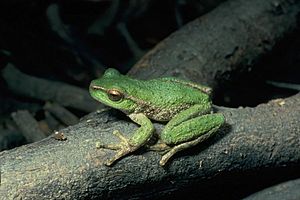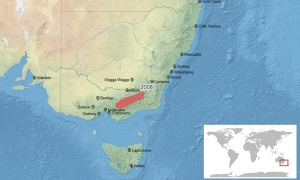Spencer's river tree frog facts for kids
Quick facts for kids Spencer's river tree frog |
|
|---|---|
 |
|
| Conservation status | |
| Scientific classification | |
| Genus: |
Ranoidea
|
| Species: |
spenceri
|
 |
|
| Synonyms | |
|
|
The Spencer's tree frog, also known as the Spencer's river tree frog or spotted tree frog (Ranoidea spenceri), is a type of tree frog. It lives in Australia, specifically near the Great Dividing Range in Victoria and New South Wales. These frogs can be found at heights between 200 and 1100 metres above sea level.
Contents
What Spencer's Tree Frogs Look Like
Adult Spencer's tree frogs are usually between 4.2 and 7.0 centimetres long. They can be green or brown and often have spots on their skin.
Where They Live
These frogs live in mountain forests. They can be found in both thick and open forests. They also live in dry forests high up in the mountains and wet forests lower down. No matter the type of forest, they always live in rocky areas close to streams.
Life Cycle and Reproduction
Female Spencer's tree frogs lay many eggs at one time. They can lay anywhere from 200 to 1000 eggs. They place their eggs between or under rocks in the water.
The young frogs, called tadpoles, eat algae that grows on rocks. They also eat dead things they find at the bottom of the water.
How long it takes for a frog to grow up depends on where it lives:
- Male frogs living lower down the mountains become adults about 18 months after changing from tadpoles.
- Female frogs living lower down become adults about 3.5 years after changing.
- Male frogs living high in the mountains become adults about 3.5 years after changing.
- Female frogs living high in the mountains become adults about 4.5 years after changing.
Adult Spencer's tree frogs mostly eat insects.
Why They Are in Danger
The Spencer's tree frog is a critically endangered species. This means it is in great danger of dying out completely. Scientists have only ever found this frog in 19 different streams. Sadly, the frog has already disappeared from 4 of these streams.
The frogs in the remaining streams form 12 separate groups. These groups only mate with other frogs within their own group. Adult frogs do not move very much. Scientists believe that a single frog might not move more than 80 metres in its entire life.
Scientists are not completely sure why this frog is endangered. However, they think many of them died during the 20th century. They believe that two types of invasive species, the rainbow trout and brown trout, are eating the tadpoles. Also, this frog can get a fungal disease called chytridiomycosis, which can be very harmful.
See also
 In Spanish: Litoria spenceri para niños
In Spanish: Litoria spenceri para niños


